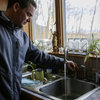Historical societies heed message of cooperation
The Enterprise –– Michael Koff
One of the many deadly battles fought during the Civil War was at Cold Harbor in Virginia. Bob Mulligan, right, dressed in a Union uniform, discusses the battle with Dan Driscoll, of Knox, as another patron looks at figurines recreating the battle — all part of last Sunday’s grand opening of a Civil War exhibit at the Voorheesville Public Library. The library collaborated with the 125th New York Volunteer Infantry, the Capital District Civil War Round Table, Uncle Billy’s Balladeers, the Knox Historical Society, and the Helderberg Quilt Barn Trail project on the exhibit and reception.
The Enterprise — Marcello Iaia
Robert Weible, the state’s historian and chief curator of the state museum, delivers his speech during the annual Association of Public Historians conference in the Gideon Putnam Hotel on March 17. "I'm the historian in the room," he encouraged the audience of historians to say in holding firm on the quality of history promoted for tourism.
KNOX — Historical societies in Albany County resolved this month to meet quarterly to find ways of cutting overlap and collaborating.
The first county meeting will be in the Knox Town Hall, after a tour of the Saddlemire Homestead that serves as the rural town’s history museum, said Jane McLean, vice president of the Knox Historical Society. The working title of her talk for the group in June is “No-Cost, Low-Cost Collaboration.”
The societies met earlier this month, she said, invited by the Albany County Historical Association, to see the space they could use for exhibits and meetings in King's Place, a rehabilitated historic home in the Arbor Hill neighborhood of Albany. The county association cited the influence of Robert Weible, New York’s state historian and the chief curator of the state museum, who has been encouraging organizations and state agencies to look to each other in a climate of fewer funds.
In his State of the State’s History speech to the Association of Public Historians meeting at the Gideon Putnam Hotel this week, Weible suggested historians work with people developing tourism in their regions, but he stressed that the history involved be accurate and meaningful and not to relinquish editorial control.
“Bad history leads to bad policy, leads to a bad future,” Weible told the crowd.
One way of raising awareness for history, promoting programs, and reducing overlap, Weible said, is by mixing government, charitable, and private sources of funds for programs.
Weible and others have delivered the message of cooperation for decades, he said. Since the 1960s, he said, the taste for spending public money on history and arts has waned and historical organizations and institutions developed as unnecessary competitors, where museums would build programs around their own collections.
Suggestions for cooperation in the meeting at King's Place included publishing a book on Albany County history with input from its different societies, shared training for their treasurers, developing walking tours, and a website that would act as a hub for county historical organizations, said Marie Erkes, president of the Albany County Historical Association.
Last year, when the Association of Public Historians of New York State met in Syracuse, starting its annual conference, the Museum Association of New York had just ended its own conference in the same city two hours earlier.
“We realized we needed to talk to each other,” said Gerald Smith, president of the historians’ association.
He said cooperation hasn’t been mandated, but that he and Weible have been trying to find solutions among statewide agencies before sharing them with smaller, local organizations.
Smith, the historian for Broome County and the City of Binghamton, said he and Weible have spoken to people in the state’s archives, parks, the state museum, and the Council for the Humanities, about how to plan better and raise public awareness of history.
In Broome County, the City of Binghamton funds some of the county library because it’s located in the city, Smith said. The Broome County Local History and Genealogy Center combines the resources of the county library, the county historical society, the Broome County Historian and the City of Binghamton Historian.
Budgets for historical institutions and societies never rivaled those of other municipal departments, but New York law requires each town to appoint a historian.
Historical societies in Berne and Knox and the curator of the Altamont Archives, Marijo Dougherty, developed a lesson plan, called “Suitcases of History,” that brought objects in their collections into the Berne-Knox-Westerlo Elementary School. They displayed local artifacts — like a row of sleigh bells and a soapstone bedwarmer — for fourth-graders to see and touch.
The project was designed to conform to the Common Core Learning Standards adopted by the state, which focus on students’ ability to analyze, cite, and discuss primary and secondary source materials.
“They’ve got to know where those are,” Smith said of teachers and students. “Quite often, they’re in the local museum, the local historical society.”
In order to appreciate local history, Weible, a former president of The National Council on Public History, told The Enterprise, it must be put in the context of state and larger history; that way, people from outside of the community can find meaning in it. Then people see it as a place to live and invest.
“If you can show that you value your place, if it works, it’s going to catch on,” said Weible.


